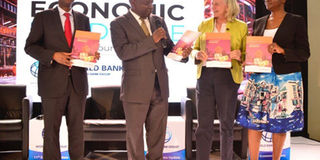World Bank tells Uganda to expand its tax base

Report. Left to right: Senior public sector specialist of the World Bank Moses Misach Kajubi, State Minister of Finance for Planning David Bahati, World Bank country manager Christina Malmberg Calvo and Ms Racheal Sebudde, a senior economist at the bank, launch the financial institution’s report on the state of Uganda’s economy in Kampala yesterday. PHOTO BY RACHEL MABALA
What you need to know:
- Key issues. The World Bank recommends, among other things, that Uganda should strengthen its tax system by reducing exemptions, broadening the tax base and tapping into hard-to-reach informal activities to lift taxable proportion of the Gross Domestic Product (GDP) from 14 per cent to 20 per cent.
Kampala. The World Bank has advised government to expand its tax base in order to sustain economic growth and development.
While launching the financial institution’s report on the state of Uganda’s economy yesterday, Ms Christina Malmberg Calvo, the World Bank country manager, said the country should create more entities and ensure transparency.
“An important way to broaden the tax base is to improve public service delivery and Public Investment Management. Tax payers need to see and sense that their taxes are well spent. Another important thing is to improve transparency around who pays taxes, and who is exempted,” Ms Malmberg said.
“Just as government has in recent years improved transparency around the national budget process, it now introduce and accountability measures in the collection and management of public revenue,” she added.
Ms Malmberg said Uganda collects about 14 per cent of GDP in revenue, which is below the country’s tax collection potential.
She said as a comparison, Kenya collects about 18 per cent of its GDP in revenue and Rwanda 16 per cent.
Currently less than 7 per cent of the working population and 10 per cent of firms are registered as taxpayers in Uganda.
Ms Malmberg said the second measure is to make sure that the tax instruments become more efficient, pointing out that improving the efficiency of instruments means,among other things, decreasing the number of tax exemptions that are granted.
In the recent past, the government has in some renewed tax exemption habit to the investors.
The World Bank official said tax exemption today amounts to 4 per cent to 5 5 per cent of the GDP.
The third measures she proposed is to raise efficiency of the tax administration, strengthen the capacity of tax authorities in terms of staffing and IT risk-based so that they can pursue modern tax audit methods.
These include formalising taxpayers who are doing business in the informal sector.
Presenting the key findings of the report, Ms Racheal Sebudde, a senior economist at the World Bank, Uganda’s fiscal deficit was 4.9 per cent of GDP, 1.5 percentage points lower than the previous budget of 2017/18 of 4.8 per cent.
Ms Sebudde said tax revenue is being projected at 12.9 per cent this financial year compared to 14 per cent of the previous year due to under performance on interest income, corporate income, Value Added Tax (VAT) on local goods and excise duty on imports.
On the economic growth outlook, the World Bank maintained its forecast for Uganda at 5.5 per cent.
Ms Sebudde said the projection still hinges on stronger investment and weather.
“From the estimated 5.5 per cent in Financial Year 2017/18, the economy could accelerate to 6 per cent in subsequent two years, driven by investment in oil infrastructure-roads, pipeline infrastructure could boost growth,” she said.
Ms Sebudde said continued good weather is resulting in stronger agricultural performance registering growth rate of 6.3 per cent.
Meanwhile, the high global economic growth could push private investments, exports demands for Uganda’s commodities and remittance in Uganda. Lately, Uganda has registered recovery in high economic growth in the four quarters.
Ms Sebudde said all sectors supported recovery.
She said industry registered growth of 6.4 per cent with manufacturing growing at 5.4 per cent, services sector accelerated to almost 9 per cent driven by the ICT with 15 per cent growth financial services at 12 per cent and trade at 7.6 per cent.
Recommendations
Recommendations from the report include reducing tax expenditures, which have the potential to raise revenues by up to 5 per cent of GDP annually and enhancing public awareness, transparency, and civil society engagement to increase voluntary tax compliance.
Key issues
The World Bank recommends, among other things, that Uganda should strengthen its tax system by reducing exemptions, broadening the tax base and tapping into hard-to-reach informal activities to lift taxable proportion of the Gross Domestic Product (GDP) from 14 per cent to 20 per cent.




